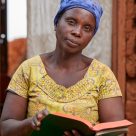Bishop Rachel has added her voice to the long-established 16 Days of Activism against Gender-based Violence campaign, which begins each year on International Day Against Violence Against Women (November 25). She calls on the Church to recognise and act on domestic abuse within the communities it serves.
In the first of 16 videos to mark the 16 days of activism, Bishop Rachel says that domestic abuse must no longer be a taboo subject that the Church is reluctant to talk about. While churches must recognise it does take place in the homes of those involved in our worshipping communities, she adds that churches can also be part of the solution, offering support and teaching good practice and theology and challenging the misuse of scripture in relation to women. She stresses it is not just violent behaviour but also controlling and coercive behaviour, and notes that while the majority of reports relate to violence against women, men are victims too.
She says there is still ‘a long way to go’ from the General Synod motion in 2014, which urged parishes to be actively involved in eliminating gender-based violence and ‘we must acknowledge that within our churches we have victims, survivors and perpetrators of domestic abuse’. She also highlights that the Church of England now provides a short and accessible online course regarding domestic abuse.
The Church of England is supporting the campaign. Newly released figures show that there has been a 37% increase in reports of domestic abuse to diocesan safeguarding advisers over the past three years (2019-2021). These are reports relating to the work of the local church in its community, collected in a diocesan self-assessment audit.
The figures, taken from diocesan self-assessment key safeguarding data, relate to reports and concerns from all aspects of church life. The figures show that reports of domestic abuse to diocesan safeguarding advisers rose from 217 in 2019 to 297 in 2021; 21% of all reported safeguarding concerns relating to adults have been directly related to domestic abuse over the three-year period. In 2020 and 2021, domestic abuse was the most common reason for a safeguarding referral to be made to a diocesan safeguarding adviser about an adult. The increase in concerns and allegations regarding domestic abuse over this period mirrors the wider societal position with domestic abuse charities reporting a far higher number of concerns and allegations.
Bishop Rachel was one of a number of bishops in the House of Lords who contributed to the passage of the Domestic Abuse Bill through Parliament, and which became legislation (the Domestic Abuse Act) last year; for the first time it recognises children as victims of domestic abuse as a result of seeing, hearing or experiencing it.
Speaking this week, she said: “I urge as many people as possible in our churches to use these 16 days to undertake the Church of England training. As the Domestic Abuse Commissioner highlighted earlier this month, the cost-of-living crisis is rapidly becoming a national emergency for domestic abuse victims who cannot afford to leave perpetrators and these new stats show that there are more Church referrals than ever before. These 16 days provide a real focus for us all to shine a light in places of darkness and shadow.”
A range of videos and resources will be published on the Church of England website during the 16-day awareness campaign and will include the voice of survivors of domestic abuse and individuals and organisations that support those experiencing domestic abuse. This includes a message from the Bishop of Colchester, Roger Morris, who shares in a recorded message the vital work in Chelmsford Diocese on domestic abuse working with statutory services including Essex Police. He also highlights the Mothers’ Union campaign, which is supporting the 16 days with Bible verses and prayers for each day along with video messages. The Mothers’ Union is calling on its four million members around the world to support a one-minute silence at 1.03pm on 26 November 2022 to raise awareness.
Support services are available both locally and nationally to support both individuals and families that have experienced domestic abuse. And, if you are immediate danger, please call 999.
- National Domestic Abuse Helpline
- Men’s Advice Line
- Mankind
- Parental Education Growth Support (PEGS)
- Women’s Aid
- The Mix (free information and support for under 25s)
- National LGBT+ Domestic Abuse Helpline (run by Galop)

















